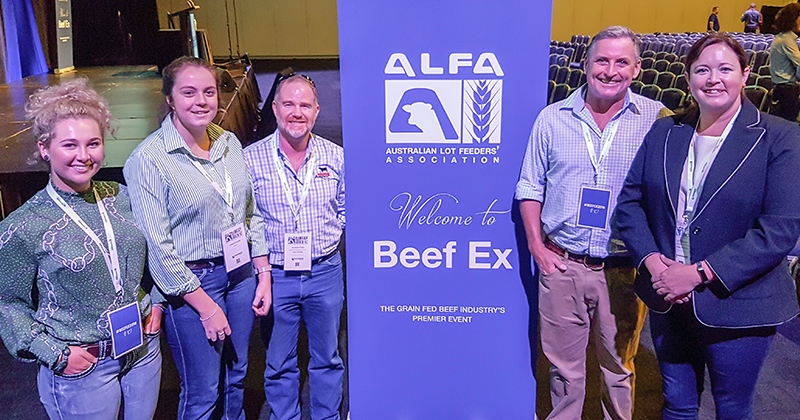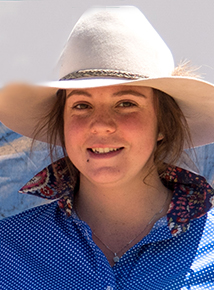Wrap Up Time: BeefEX Conference


On the 8th to the 10th of October the ALFA BeefEX Conference rolled into Brisbane, with Angus Youth scholarship recipients Hannah Cargill and Ruby Canning in attendance.
The girls, who were awarded the scholarships in September, had the opportunity to experience speakers, trade stands and networking functions, focusing on topics relating to consumer trends, the economics of the beef industry, global markets, producers and finance incorporated with leadership.
The following reports have been put together Miss Canning and Miss Cargill regarding their BeefEX experience:
Top image: Ruby Canning, Hannah Cargill, Angus Australia’s Northern Development Officer, Jonathan Farris, BeefEx Master of Ceremonies, Ben Dark & Angus Australia’s Commercial Supply Chain Manager, Liz Pearson.

The BeefEx Conference was an experience that was engaging, informative and provided many networking opportunities for all participants. Topics discussed throughout the conference by a range of industry leaders included consumer trends and the economics of the beef industry, as well as a focus on markets, production and finance incorporated with leadership. The incorporation of international and Australian presenters ensured the event focus of ‘big data’ was well covered in a comprehensive manner, and ensured a grasp on the position of Australian beef within global markets.
Highlighted throughout the event was the consistency and quality of Australian beef, which is being supplied both domestically and internationally. As someone that has grown up within the beef industry and is involved with both seedstock and commercial production, this is something to be proud of as evidentially our management practices and genetic selection has successfully maintained profitability. Intertwined within presentations throughout the conference were concepts of leadership and innovation, and how these are being applied to ensure continued profitability within the industry.
During our two days at the conference we were part of seminars that were certainly an eye-opening perspective into the industry. Additionally it was great to hear from speakers from the USA and New Zealand, as well as Australia. The networking opportunities whilst attending BeefEx were incredible, as was the social events, trade stands, and the time we got to spend with other like-minded individuals.
To begin our time at BeefEx Hannah and I attended the presentations from the competitors within the “Communicate your research Competition”. To hear about this research and their findings was an application of leadership, and the importance it has within our industry. Their presentations were insightful and were delivered alongside a power point. These presentations were a true testament to their dedication, as well as their passion for the beef industry. Topics discussed regarding research undertaken included storage of primal cuts, and their ability to withstand optimal and non-optimal storage conditions, the influence of feedlot cattle behaviour on production parameters, and effects of vegetable waste silage on rumen fermentation characteristics.
The first session speaker, Stephen Scheeler – Former CEO of Facebook ANZ, certainly provided us with food for thought when he communicated with listeners about what Facebook and other tech giants think about innovation, data and technology and what this means for the future. The aspect of leadership was further understood when Stephen explained the 8 elements of leadership, and how the change of mindsets contributes to reimaging business models and business processes, as well as focussing on opportunities which may arise from the integration of a mix of individuals.
The verification and branding of Angus beef strengthens the integrity and confidence in the Angus breed and this was explained by the Angus Australia’s Commercial Supply Chain Manager, who were one of the Silver BeefEx sponsors.
Within society today, sustainability is a widely discussed as it engages both current and future generations. Throughout the event, social, environmental, and economical sustainability was addressed. It was interesting listening to David Williams, Senior Vice President of Informa Genetics, Robert Herrmann from Mecardo and Daniel Terrill from Deloitte Access Economics Pty Ltd about their ideas and perspectives on the global beef demand outlook, as well as current beef consumption both within Australia and globally. They also explained further projections for markets and expected grain prices. From an economic point of view the feedlot industry is vital, as the national feedlot industry contributes a total of $4.4 billion to Gross Domestic Product (2017), as well as indirectly contributing $3.9 billion to the economy through the purchase of business inputs. The largest export potential remains in Asia, as Australian beef has several competitive advantages including geographic proximity, exchange rates (except against Brazil), quality, health reputation, and trade agreements. Within today’s society we need our feedlots, as through models we can see there would be a range of sectorial impacts both upon the grazing industry and the processing industry if feedlots were to be removed. If we didn’t have feedlots, there would be impacts on the grazing industry including restructuring of herds and beef enterprises, fewer cattle being turned off grazing land leading to reduced industry productivity. Additionally with lower production there will be reduced demand for feeder cattle and feed inputs. Furthermore, this will also influence the processing industry. As there will be greater seasonality of cattle supply (lower consistency) resulting in lower utilisation of capital, lower average pasture slaughter weights for pasture finished cattle will result in reduced processing efficiency. The reiteration of the importance of the feedlot industry was further confirmed as statistics show that the absence of the feedlot industry would lead to a $10.3 billion lower GDP in 2029, as well as the loss of 49,000 full time employees by the same time.
‘Consumer is King’ was a presentation from Lisa Sharp (Chief Marketing & Communications Officer, MLA). She explored consumer demand drivers, global trends influencing consumers, what is shaping their buying decisions and the resulting opportunities and risks facing producers/ I found this presentation of most interest to me due to my major in marketing at university. I enjoyed listening to Lisa as I had the opportunity to attend her presentation at Beef in Rockhampton earlier this year. The key messages throughout her presentation surrounded the ideas that consumers pay for the attributes (of red meat) that they want. She explained quality is many attributes and value is more than price, whilst ethics plays a large role in the quality equation.
Richard Fowler, a Nuffield Scholar from New Zealand, gave us a perspective into the world of synthetic foods and the drivers which included animal welfare, population growth, and environmental impacts surrounding livestock production.
We heard from representatives from Westpork, Informa Economics, Xinova, and Manobotix, in addition to a group of individuals who informed us about the Australian Rural Leadership Program. The panel shared insight about their leadership journeys and the importance of prioritising and time management as a leader, dealing with stress, having the strength to speak up within situations, and understanding that leadership is the path to selflessness. This discussion was of great interest to me, as it was interesting listening to individual leadership pathways.
I have had the privilege of being involved within agriculture of all my life, and the beef industry is one of my greatest passions. I hope to use the connections from BeefEx and knowledge gained about opportunities within the industry to shape my future involving beef cattle. I enjoyed being able to network and meet with other people who are passionate and involved within the feedlot industry, in addition to industry representatives from a range of agricultural companies. Prior to attending the conference, I hoped to gain an extensive understanding of how feedlots work, how technology is being adapted to increase the accuracy and productivity of operations, and an insight into the main issues surrounding production and management of grain fed animals, with understanding market trends. My endeavours were succeeded far and beyond, I sincerely thank the Angus Australia Foundation for allowing me to attend BeefEx, as it was truly an unforgettable and beneficial experience.

BeefEx was held in Brisbane this year, where the conference attracted many members of the industry to come and discuss how it is going to move forward and adapt in the years to come due to our ever-changing society.
The conference had many high-profile individuals and companies, who were not only from all around the country but also from the USA and New Zealand as well. These speakers all brought many new ideas into the discussions about innovating technology, future consumer demands and trends regarding traceability and blockchain, practice and safety as well as finance and marketing.
Stephen Scheeler discussed teamwork in a company and building those relationships to ensure your team works efficiently in their space together. Stephen Scheeler is now the owner of his own business called DIGITAL CEO but is most commonly recognised of being the former CEO of Facebook ANZ. He also discussed the effect of social media bases and how they are constantly changing around us, and how continuously more people are signing up to social media bases at a rapid rate. Another main point he discussed was how we need to learn to use our time effectively as it is “a fixed resource and speed is a learned skill”.
Adapting technologies such as ‘Block Chain’ to our industry as a whole to keep a ‘paddock to plate’ record was also discussed by Ted Connell from Intel. This can create efficiency in the supply chains in the future by being able to have almost full traceability throughout the supply chain as well as being able to ensure food safety, opening new markets and logistics. This will also generate a larger power to the consumer as they are able to see the whole process and create a better understanding.
An interesting study was proposed to the conference by Douglas Liebe, a U.S. PhD Student studying Animal and Poultry Sciences. They carried out a study to find out what would happen if the U.S. stopped producing animals for food and all Americans adopted veganism. This study was to find if it would reduce the greenhouse gases produced during animal production. Key points found by the study were that it would be difficult to meet all nutrient requirements for the whole population and there would be only a minor decrease in greenhouse gas emissions if animals were to be taken out of production. There was a need found to focus on the limiting nutrients that were not found in other foods or legumes. Some constraints found were the climate that is needed in a vast area to be able to produce other crops and legumes, as they found that while vegan diet do work, it would not be possible to scale the vegan diet for a whole population.
Following this topic, there was discussion into synthetic meats and “the impossible foods”. These foods developments are trying to encourage people to still eat meat while there is no harm to the animal, as the meat has been lab grown from muscle tissue extractions.
Some of the final topics of discussion were related to safety in the workplace, new technologies and systems such as “Enable HR”, as well as discussing internet connections being a large issue throughout regional Australia where most of our industry is based which can become an issue to producers as they struggle to complete things such as paying bills or making phone calls. Finally, another largely discussed topic throughput the whole conference was the importance of leadership in the workplace and the point that isis not only the employer or the managers responsibility but every employee’s responsibility too.
Many companies present had stalls set up ranging from machinery to feed supplements and cattle assessment. These stalls were great to walk around and gave us opportunity to interact with members in the industry that are helping producers in all kinds of ways.
Finally, I’d like to thank Angus Australia for this amazing opportunity to attend BeefEX. Angus Australia gave me the opportunity to attend this amazing conference organised by ALFA that I never thought I would attend. This conference has given me the opportunity to grow a greater insight into the feedlot industry and to learn many new and different aspects of the beef industry as a whole. I have expanded my knowledge about the industry, the supply chain and had the chance to network with many members in the industry. I would strongly encourage anyone thinking of applying to do so as you can get so much out of the conference and the associated events.